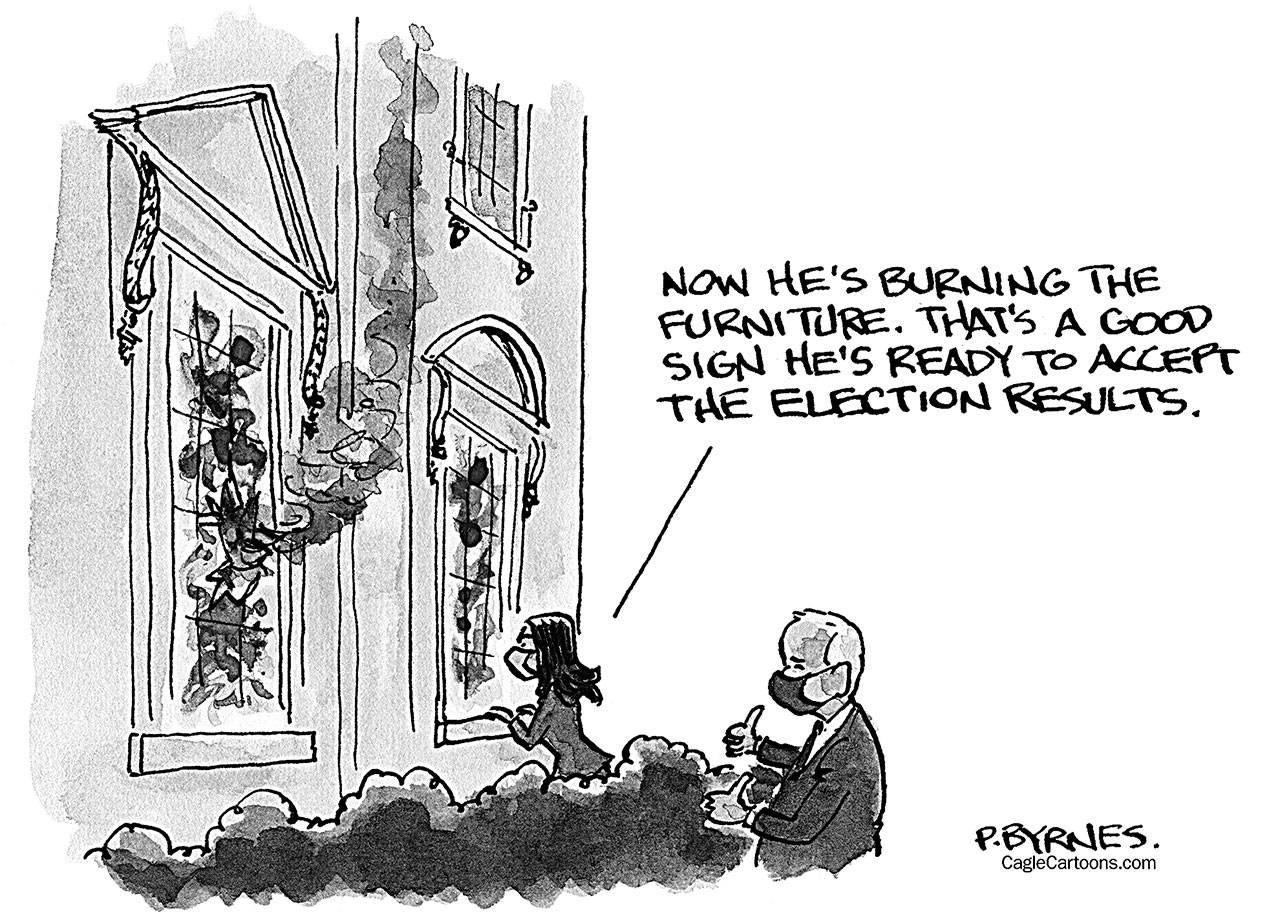By Nicholas Goldberg
Los Angeles Times
Sometimes it feels like democracy is just too dysfunctional.
Voters are disengaged and uninformed. Congress is hyperpartisan — and so self-serving it can’t govern effectively.
Between our increasingly politicized courts, our 18th century constitution, our antiquated Electoral College and our modern-day corporate lobbyists and billionaire donors, it sometimes seems like the system was designed to fail.
Making matters much worse, we’ve suffered for four years under a president whose contempt for rules, norms and institutions has further undermined the system — and who is now engaging in a brazen and extraordinary refusal to concede the election he has lost.
It’s no wonder scholars like Larry Diamond are raising serious questions about the future of democracy in the United States.
I called Diamond, a political science professor at Stanford who has written for decades about what makes democracies endure and what makes them fail. “There’s been an existential crisis of democracy during the Trump presidency,” he told me. “There’s a real question whether it will survive in the United States.”
It’s all very disheartening. But just when I get most disillusioned with the system we have, I remember what I’ve seen around the world, where people often struggle for entire lifetimes in hopes of building or protecting the kind of rights and rules that we have here in the U.S.
As Trump continued his outrageous assault on the election results, I thought about the visit I received in my Los Angeles office from Joshua Wong in 2015.
Wong, then 18, was already a hero at home in Hong Kong. Fresh-faced, determined and optimistic, he told me about how he fit his activism on behalf of democracy into a schedule that also included doing his homework. Since then, Wong has been repeatedly arrested and imprisoned, but he continues to risk his life to secure the kind of freedoms it’s easy to take for granted here. And he isn’t alone in his struggle against the continuing Chinese crackdowns. The last time I was in Hong Kong, in 2019, it was a time of mass protests, and tens of thousands of courageous residents turned out day after day to fight what may yet be a losing battle to preserve the freedom and rights they’ve enjoyed in the past.
I also think of the places I’ve covered as a journalist that were truly unfree and undemocratic. Worst of all was Saddam Hussein’s Baghdad, a dark and unhappy city in the late 1990s where fear was palpable in the streets and in people’s homes, a city where omnipresent soldiers and secret police repressed all dissent. I felt scared the whole time I was there. Not long before my visit, Hussein had won reelection as president of Iraq with 99.96% of the vote. Now that was election fraud.
On another trip, I covered a presidential election in Iran in which dozens of candidates were disqualified from the ballot because they didn’t meet with the approval of the country’s mullah and ayatollahs.
It was encouraging for a time to watch the Palestinians in the West Bank and Gaza Strip as they enthusiastically began to build a country of their own — including issuing postage stamps, opening a stock exchange, building an airport, establishing a parliament and holding national presidential elections. Soon, said Palestinian leader Yasser Arafat, “we will have our own telephone country code.” For many Palestinians, the exercise in nation-building was a joyous one, a chance to finally control their own destinies. Many harbored hopes — against steep odds — that the emerging nation would be a democracy, one of the few in the region. But the whole enterprise collapsed shortly after it began when the Oslo peace process between Palestinians and Israelis failed.
I came back to the U.S. from my years as a foreign correspondent with a new respect for the democracy in which I grew up.
Of course it’s flawed. It is too often inequitable or unfair; it’s disparities in wealth and power are unacceptable; its history of racial injustice is shameful. Of course we need to move past tribalism, polarization and bigotry, to implement reform and to find effective leaders who will put country ahead of party.
But we’re far luckier than much of the world, where anti-democratic movements are again gaining ground, including in Hungary, Poland, Turkey and elsewhere. I realize I’m setting a low bar for comparison, but the point is we’re lucky to have a firm foundation on which to build.
Winston Churchill’s assertion that democracy is the worst form of government except for all the others may be overused, but it’s true.
At the moment, we remain remarkably free in the United States. We voice our dissent boisterously. Our electoral system has once again proved itself honest, despite the current president’s assertions otherwise. Our institutions were battered, but they mostly withstood the Trump onslaught.
Now we need to fight to keep it that way. Making democracy work is a national project; it doesn’t just happen on its own. It takes engagement, patience, struggle and a measure of faith. In contrast, the surest way to see it fail is to take it for granted.



